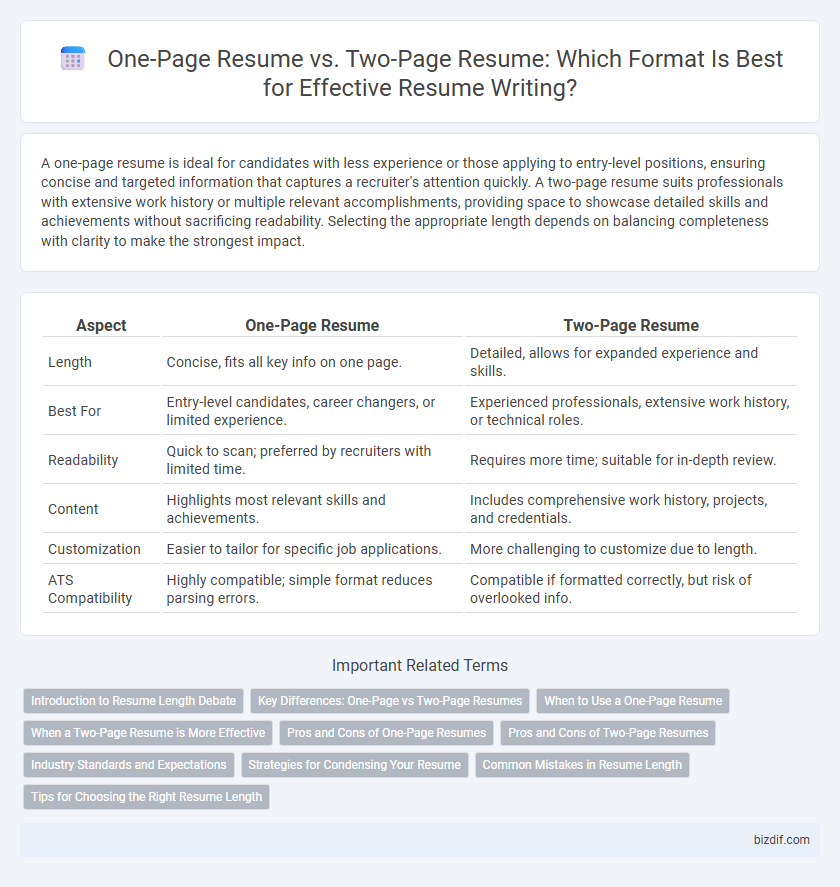A one-page resume is ideal for candidates with less experience or those applying to entry-level positions, ensuring concise and targeted information that captures a recruiter's attention quickly. A two-page resume suits professionals with extensive work history or multiple relevant accomplishments, providing space to showcase detailed skills and achievements without sacrificing readability. Selecting the appropriate length depends on balancing completeness with clarity to make the strongest impact.
Table of Comparison
| Aspect | One-Page Resume | Two-Page Resume |
|---|---|---|
| Length | Concise, fits all key info on one page. | Detailed, allows for expanded experience and skills. |
| Best For | Entry-level candidates, career changers, or limited experience. | Experienced professionals, extensive work history, or technical roles. |
| Readability | Quick to scan; preferred by recruiters with limited time. | Requires more time; suitable for in-depth review. |
| Content | Highlights most relevant skills and achievements. | Includes comprehensive work history, projects, and credentials. |
| Customization | Easier to tailor for specific job applications. | More challenging to customize due to length. |
| ATS Compatibility | Highly compatible; simple format reduces parsing errors. | Compatible if formatted correctly, but risk of overlooked info. |
Introduction to Resume Length Debate
Resume length plays a crucial role in making a strong first impression with hiring managers, with debates often centered on whether to choose a one-page or two-page format. One-page resumes highlight concise, relevant experience and skills, ideal for early-career professionals or those with limited work history. Two-page resumes allow for more comprehensive details on accomplishments and expertise, typically suited for candidates with extensive experience or diverse qualifications.
Key Differences: One-Page vs Two-Page Resumes
One-page resumes focus on concise presentation, highlighting essential skills and experience ideal for entry-level candidates or professionals with limited work history. Two-page resumes allow for a more detailed account of accomplishments, certifications, and projects, suitable for experienced candidates or those in specialized fields. Choosing between one-page and two-page resumes depends on the depth of relevant experience and the employer's preference for brevity or comprehensive information.
When to Use a One-Page Resume
A one-page resume is ideal for entry-level candidates, recent graduates, or professionals with less than 10 years of experience, as it allows concise presentation of skills and accomplishments without overwhelming the recruiter. Employers in fast-paced industries or for junior roles often prefer one-page resumes to quickly assess qualifications. Tailoring a one-page resume to highlight relevant achievements and keywords increases the chances of passing Applicant Tracking Systems (ATS) and securing interviews.
When a Two-Page Resume is More Effective
A two-page resume is more effective for professionals with over 10 years of experience or extensive technical skills that require detailed explanation. Employers in industries like engineering, academia, or senior management prefer comprehensive resumes that showcase a broad range of accomplishments and leadership roles. Including measurable achievements and project outcomes on a second page can significantly enhance the candidate's credibility and impact.
Pros and Cons of One-Page Resumes
One-page resumes offer concise presentation, making it easier for recruiters to quickly scan essential qualifications, especially for early-career professionals or roles requiring brief overviews. They help highlight key skills and experiences without overwhelming content, but risk omitting detailed achievements that could strengthen candidacy for senior positions. Limited space may hinder the ability to fully showcase complex project outcomes, extensive work history, or specialized technical expertise.
Pros and Cons of Two-Page Resumes
Two-page resumes provide ample space to detail extensive work experience, skills, and achievements, making them ideal for seasoned professionals or those with diverse expertise. However, longer resumes risk overwhelming recruiters and may lead to critical information being overlooked if not structured effectively. Ensuring clear formatting and prioritizing relevant content is essential to maintain engagement and highlight key qualifications on a two-page resume.
Industry Standards and Expectations
Industry standards often dictate the preferred resume length, with one-page resumes favored for entry-level and early-career professionals to ensure concise and relevant content. Two-page resumes are generally accepted for candidates with extensive experience or specialized skills, particularly in technical or executive roles where detailed accomplishments and qualifications are necessary. Recruiters typically expect a clear, well-organized format that balances brevity and comprehensive information, aligning with the norms of specific industries such as finance, technology, or academia.
Strategies for Condensing Your Resume
Focus on selecting the most relevant work experience and quantifiable achievements to prioritize content on a one-page resume, enhancing clarity and impact. Use bullet points with concise phrases and strong action verbs to communicate responsibilities efficiently, reducing unnecessary details. Tailor the resume by excluding outdated or unrelated roles, ensuring the most pertinent information aligns with the job description and industry standards.
Common Mistakes in Resume Length
Selecting between a one-page and two-page resume often leads to common mistakes such as overcrowding a single page with excessive details or unnecessarily extending content to fill two pages. Employers typically spend only 6-10 seconds per resume, so clarity and relevance must be prioritized over length. A concise, targeted resume showcasing key achievements improves readability and impact, avoiding dilution of critical information by irrelevant or outdated data.
Tips for Choosing the Right Resume Length
Choosing the right resume length depends on your experience level and industry standards; one-page resumes suit entry-level candidates or those with limited work history, while two-page resumes are ideal for professionals with extensive experience or accomplishments. Prioritize relevance and clarity by including only the most impactful information tailored to the job description, ensuring concise formatting and strategic use of keywords to pass applicant tracking systems. Assess the specific role's requirements and recruiter preferences to balance detail with brevity, maximizing the resume's effectiveness in capturing attention quickly.
One-page resume vs Two-page resume Infographic

 bizdif.com
bizdif.com